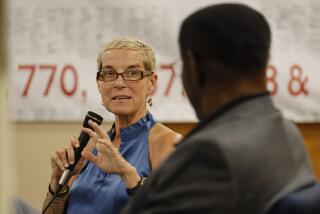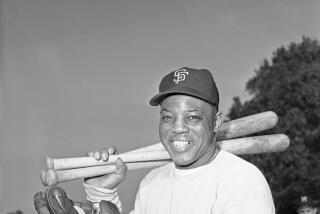E. Walter Miles, activist and academic who crusaded for diversity, dies at 86
‘Godfather of Black Faculty’ spent more than 30 years at San Diego State.
- Share via
His specialty as a pioneering Black political science professor at San Diego State was the U.S. Constitution, and E. Walter Miles saw that founding document as a living thing that needed exercise now and then.
So he was an activist as well as an academic.
Miles, who died July 8 in San Diego at age 86, had a social-justice resume that included desegregating restaurants in Indiana, boycotting businesses that discriminated in Texas, and pushing for equitable housing in North Carolina.
“I was born into it,” he said in a 1993 interview with an American Civil Liberties Union publication, which helps explain why he was willing to come to San Diego State in the mid-1960s and be the only Black professor on campus.
He spent more than 30 years at the university, including a term as head of the political science department, and is remembered for starting public law classes that are still taught there.
He co-authored the textbook “Vital Issues of the Constitution” and was a contributor to “Great Cases of the Supreme Court,” which included summaries of landmark decisions involving slavery, the right to vote, and freedom of expression.
A member of the editorial boards of several academic journals, Miles was also active in the American Political Science Assn., serving on a committee that tried to increase the diversity of those who participated in the discipline.
In the community, he led the San Diego chapters of the Urban League and the ACLU, and also served on the ACLU’s national board.
Elijah Walter Miles was born May 4, 1934, in Hearne, Texas, one of eight children. His parents, John and Millie Miles, ran a tailor shop and believed in education and civic engagement. All their children went to college.
“My parents taught their kids to be active,” Miles once told an interviewer. “We got it naturally.”
He went to Prairie View A&M in Texas, and then, after a stint in the U.S. Army in Korea, to Indiana University, where he earned a master’s and a doctorate in government and a nickname that stuck: Wally.
Drawn to political science as an academic specialty, he taught and did research at Indiana, Prairie View A&M and the University of North Carolina for several years. At each of those stops, he was also active in anti-discrimination protests in the surrounding communities.
Miles was hired at San Diego State in 1966, and a year later won a distinguished teaching award. There had been a handful of Black professors on campus before him, but none when he arrived, according to the 2019 book “The Black in Crimson and Black: A History and Profiles of African Americans at SDSU,” by retired university librarian Robert Fikes.
The book described Miles as “a natural politician who was a master at getting things done behind the scenes,” and called him “The Godfather of Black Faculty.”
“He was very much respected by his colleagues,” said Farid Abdel-Nour, current chair of the political science department. “The term that keeps coming up when people talk about him is ‘mentor.’ They saw him as a mentor and a trusted advisor.”
Two of the classes that Miles designed, Law and the Political System and The Supreme Court and Contemporary Issues, “remain extremely popular with students today,” Abdel-Nour said.
In 1990, Miles and other university employees went public with a report criticizing the school for not doing enough to hire and promote Black faculty and staff. It said administrators had substituted “meaningless rhetoric” for “meaningful progress,” noting that the number of Black employees had increased by only six from 1975 to 1988.
Administrators disputed many of the report’s findings, but pledged to keep working on what they agreed was a problem. In 1990, according to the report, about 2% of the faculty was Black. This fall, it was 3.6%, according to campus statistics.
“That’s what he was about,” said Tony Miles, one of his sons. “He wanted to create change so that people coming along after him would have it better.”
Survivors include his wife of 62 years, Frances; two sons, Christopher and Tony; two sisters, Iola Taylor and Ella Lindsey; a brother, Edgar; and one grandson, Brayden.
More to Read
Start your day right
Sign up for Essential California for the L.A. Times biggest news, features and recommendations in your inbox six days a week.
You may occasionally receive promotional content from the Los Angeles Times.







